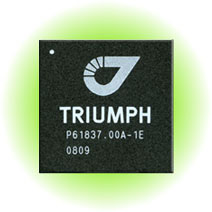At the heart of our TRIUMPH Technology is our TRIUMPH Chip. In a 17x17 millimeter power-efficient 352-TFBGA chip we have packed impressive amount of state-of-the-art functions using 0.09 micron (90 nm) integrated circuit technology.
The TRIUMPH Chip has 216 (two hundred and sixteen) channels for tracking all types of GNSS signals. These 216 channels are grouped in three categories of channels, some with 5 and some with 10 correlators, optimized to track all types of GNSS signals.
The TRIUMPH Chip can track all existing satellite signals as well as all those planned for the future. This includes all GPS, GLONASS, Galileo, QZSS, WAAS, EGNOS, and BeiDou signals.
In addition, the 216 channels open doors for special tracking features. Even for the simple case of GPS L1, for example, 20 channels can be assigned to track one GPS L1 satellite; each channel one chip apart. All channels start full 20-bit signal integration but the channel with the correct bit set will acquire the satellite. Using this technique we can track satellites under very low signal conditions.
Additionally these 216 channels are accompanied by the equivalent of 110,000 regular correlators for fast acquisition even when signal strength is very low.

Each channel is optimized to measure the most precise code, carrier and Doppler from each satellite system. The most advanced multipath reduction is also implemented for each channel. Each channel has 8-bit RF input and a tracking resolutions of 5 mm for code measurements and 0.005 mm for phase measurements.
The TRIUMPH Chip also includes a very powerful microprocessor including a 220 MHz CPU with Floating Point Unit (FPU), 4 MB internal RAM for on-chip data processing which reduces power consumption and cost.
Harmonics of transmitters like TV and radio stations may fall within the GPS band and block the reception. To defend against such in-band interferences TRIUMPH Chip has five sophisticated 64-th order adaptive anti jamming filters, in five different signal bands, capable of suppressing multiple interferences by up to 60 dB.
Decoding the bit streams of GPS L5, Galileo, WAAS, EGNOS, and similar systems, which use Viterbi decoding schemes, are very computationally intensive. To facilitate this task we have implemented Viterbi decoder and cyclical redundancy check (CRC) module in the TRIUMPH Chip hardware. The implemented Viterbi decoder has 3-bit soft decision, decoding depth of 64 and capable of decoding frames of up to 512 bit with a decoding speed of 1 Mb/sec. It can support both stream and block modes. The CRC module has a polynomial length of up to 32.
TRIUMPH Chip also includes 40 flexible programmed RF input pins, three 1-PPS timing signal outputs, three Event inputs, and two embedded PLL-s.
The sophisticated power management implemented on the 90 nm technology reduces the power consumption of the chip to the range of 0.2 to 1 Watt depending on the modules activated.
Our TRIUMPH Chip not only offers impressive and unparalleled performance, it also provides for substantial reduction in manufacturing cost. It enables us to reduce the size and power consumption and offer products at lower cost. This is not a price war, it's a technology war, which we are back to fight for you!